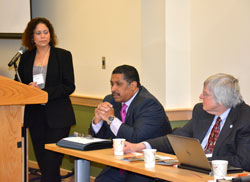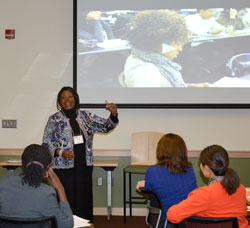"Around the College" is no longer being updated.
View current SUNY Empire Stories.
April 21, 2014
“The Future of STEM: Women and Minority Adult Students 2014 Conference”

Faculty mentor Audeliz Matais, at the podium, opens “The Future of STEM: Women and Minority Adult Students 2014 Conference.” Carlos Medina, associate provost and associate vice chancellor for the Office of Diversity, Equity and Inclusion at SUNY System Administration, addresses the audience as Joseph Skrivanek, who heads the SUNY Replication Project looks on. Photo/Empire State College
The college recently hosted and co-convened, “The Future of STEM: Women and Minority Adult Students 2014 Conference,” which was supported by a competitive award from the SUNY Conversations in the Discipline grant program.
The purpose of the grant and conference was to explore, analyze and examine opportunities for adult women and minorities, a nontraditional student population, to pursue and succeed in STEM fields.
The importance and increasing focus on the re-emergence of nontraditional students in higher education was emphasized in the recent inaugural remarks of President Merodie A. Hancock, as well as in Open SUNY and through SUNY’s grant awards.
The lack of underrepresented minorities working in STEM fields has been a topic of concern in academia nationally for a number of years; however, adult students largely have been excluded from the conversation.
Adult women and underrepresented minorities bring a different background, face different challenges and approach education in a different way, according to conference organizers. Furthermore, they add, it is essential for public higher education to address the leaky education pipeline in STEM by welcoming, retaining and graduating this nontraditional student population.
Audeliz Matias and Diane Schictman, associate professors with the college’s Center for Distance Learning, together with Pauline Carrico, coordinator of biology laboratories at the University at Albany, and Fulton-Montgomery Community College Professor of Biology Laurie Freeman were the project directors of the grant and comprised the conference steering committee.

Rabi Ann Musah, principle investigator and director of the Center for Achievement, Retention and Student Success and associate professor in the University at Albany Department of Chemistry, presents, “What has been done that supports success,” at the conference. Photo/Empire State College.
The conference opened with a panel discussion, “Why should we care? The value of adult students to STEM,” featuring Carlos N. Media, associate provost and associate vice chancellor for the Office of Diversity, Equity and Inclusion at SUNY System Administration; J. Andres Melendez, associate head of the nanobioscience constellation and empire innovation professor of nanobioscience with the SUNY College of Nanoscale Science and Engineering; and Rabi Ann Musah, principle investigator and director of the Center for Achievement, Retention and Student Success and associate professor in the University at Albany Department of Chemistry.
The other panelists were:
- Phillip Ortiz, mentor and area coordinator of science, mathematics and technology studies at the college’s Center for Distance Learning, where he focuses on STEM curriculum. Ortiz is currently serving as a provost’s fellow and acting assistant provost for undergraduate education with the SUNY system.
- Joseph Skrivanek, the founder and director of the Baccalaureate and Beyond Community College Mentoring Program established at Purchase College, which helps students transferring from community colleges to Purchase. He also heads up the SUNY Replication Project, which seeks to replicate seamless transfer programs throughout SUNY.
Several sessions followed the opening panel. Conference session presenter Preethi Radhakrishnan, from CUNY’s LaGuardia Community College, addressed the reasons adult students do or do not enterSTEM fields.
“What has been done that supports success,” was presented by Musah, and explored the higher education experience in the STEM disciplines for adult students.
The concluding plenary session, “Looking to the future,” was led by Matias, an associate professor with the college’s Center for Distance Learning.
About SUNY Conversations in the Disciplines Grant Program
The Conversations in the Disciplines grant program is designed to bring together SUNY faculty and visiting scholars from non-SUNY institutions to examine new trends, address changes and challenges, review promising research findings and become acquainted with professional developments in their fields and on other campuses. The program focuses on scholarly and creative development, rather than administrative, curricular, or instructional matters designed to foster both professional and personal growth of participants and their respective campuses.
